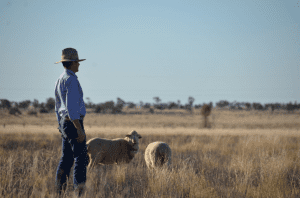A take-no-risks approach to protecting the reputation of their merino operation has put Central Western Queensland producers, David and Genevieve Counsell, at the forefront of the fight against a sinister sheep parasite.
Sheep measles are small cysts found in the muscle of sheep caused by the ingestion of eggs from the dog tapeworm, Taenia ovis and causes annual losses of $2.4 million due to trimming, carcass downgrades and condemnations.
 The Counsell family runs up to 12,000 merinos on Dunblane, an historic 16,200 ha Mitchell grass holding just west of Barcaldine which has been producing high quality wool for more than a century. The self-replacing flock includes a 50-50 male to female ratio in addition to a sheep and cattle trading enterprise as seasons permit. Ewes are typically culled at six years of age while mature wethers are offloaded at four, predominantly through AuctionsPlus.
The Counsell family runs up to 12,000 merinos on Dunblane, an historic 16,200 ha Mitchell grass holding just west of Barcaldine which has been producing high quality wool for more than a century. The self-replacing flock includes a 50-50 male to female ratio in addition to a sheep and cattle trading enterprise as seasons permit. Ewes are typically culled at six years of age while mature wethers are offloaded at four, predominantly through AuctionsPlus.
The detection of sheep measles in an abattoir trace back in 2015 marked the beginning of a detailed and forensic process of eliminating potential points of contamination to safeguard the future prosperity of the business.
The testing was part of the National Sheep Health Monitoring Project (NSHMP), an abattoir surveillance program that monitors adult sheep for a range of animal health diseases and provides feedback to producers.
“We had 800 young wethers go through an abattoir, with two per cent testing positive for sheep measles,” Mr Counsell said.
“We have undertaken an analysis to try to identify where the tapeworms came from. The tapeworm could have been passed to our sheep through dog or fox faeces or through introduced trade sheep.
“A lot of our sheep are grazing within 2km of town, which means that town dogs, wild dogs and foxes, contractor or visitors dog’s to the property could have spread the parasite in their faeces which was inadvertently consumed by our sheep grazing the contaminated pasture.”
Sheep measles are formed when sheep eat tapeworm eggs on pasture. Once ingested the eggs hatch and the larvae migrate through the gut wall, travel through the body and localise in the muscle, particularly the heart and diaphragm. The dog becomes infected when they are fed sheep meat or scavenge carcasses with viable cysts.
Livestock Biosecurity Network’s, Dr Patrick Kluver, said prevention is aimed at breaking the tapeworm life cycle, and if dogs do become infected, ensuring the tapeworms are killed before they can produce eggs.
“There are two other important tapeworms that have a sheep/dog life cycle that cause hydatid cysts and bladder worm in sheep. These will also be controlled by following the same prevention program,” Dr Kluver said.
Dr Kluver recommends taking the following precautions to protect dogs and sheep from infection:
1. Worm all farm and house dogs, monthly with a wormer that contains the active ingredient praziquantel. Hunters or contractors with dogs should provide evidence that their dogs have been treated at least three days (and no longer than a month) before they come on to the property.
2. Feed commercial packaged dog food to dogs and don’t feed or allow access to sheep or goat carcasses.
3. Secure dogs at night to stop scavenging and remove sheep carcasses to stop access for domestic dogs, wild dogs and foxes. Consider burying, burning or creating a fenced (dog proof) offal pit.
4. All home killing of sheep should occur in a dog proof enclosure. Because of the ability for eggs to spread some distance, control works best when organised on an area basis.
Because of the ability for eggs to spread some distance, control works best when organised on an area basis.
“My advice to other producers is that is makes really good sense to be following the recommendations you’ll find, like that of the Livestock Biosecurity Network, in terms of dosing your dogs on a monthly basis against tape worms and protecting your family and business,” Mr Counsell said.
Source: Livestock Biosecurities Network. For further on sheep measles see the LBN Fact Sheet here. To bolster biosecurity on your farm, download the free FarmBiosecurity app.



HAVE YOUR SAY